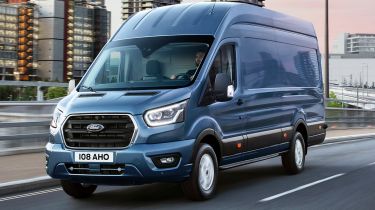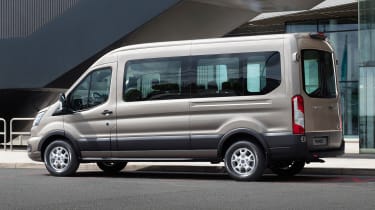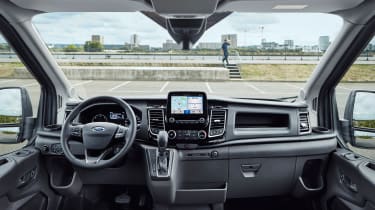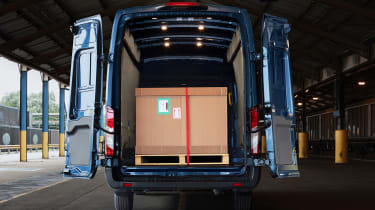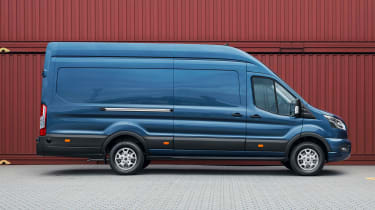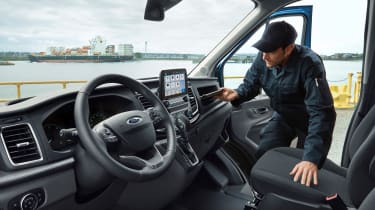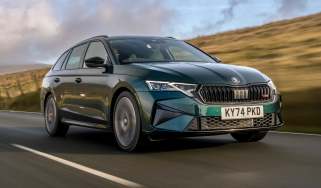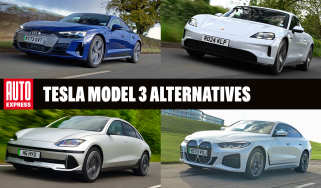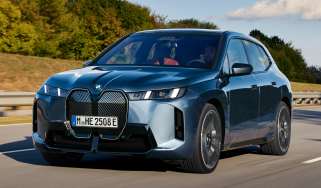Ford Transit van review
A great drive, impressive efficiency and loads of tech all help to keep the Transit legend alive
The full-size Ford Transit offers no-nonsense carrying ability and a breadth of body styles and payload weights to suit nearly every business need. Front, rear and even four-wheel drive formats are available, and all are offered with efficient mild-hybrid diesels, while all-electric power is on the way, too.
The Transit can't quite match some of the advanced safety and connectivity tech that's available on rivals such as the Mercedes Sprinter and VW Crafter/MAN TGE, but it still offers car-like technology in the cab, a surprisingly entertaining drive and decent running costs, while Ford's countrywide chain of Transit Centres means there will be an outlet near you to help keep your business on the road.
About the Ford Transit
The Ford Transit van has become so established on British roads over the last 50 years, that like the brand ‘Hoover’ the name has slipped into common parlance as the generic term for white vans of a certain shape and size.
Nowadays though, the Transit van segment is more competitive and crowded than it has ever been before, with an array of rivals that includes the Citroen Relay, Renault Trafic, Mercedes Sprinter, Vauxhall Movano and VW Crafter. And whereas there used to be only a few models of the Transit for sale, Ford is now working the Transit name harder than ever. It has a range of compacts called the Transit Courier and Transit Connect vans, as well as the medium-sized Transit Custom van, all of which sit beneath Transit ‘proper’ range.
It’s that bigger Transit two-tonne range we’re talking about here though, and in keeping with tradition you can buy your Transit in a huge number of configurations including panel vans, tipper trucks, crew cabs, minibuses and chassis cabs. All told, and including wheelbase and roof height options, Ford reckons there are 450 different ways to order one. To get you started, you can specify your Transit van in three different load lengths (called L2, L3 and L4) plus two roof heights (H2 and H3). Front-, rear- and four-wheel drive options are available too, depending on the variant.
In order to keep up with the competition, not to mention emissions regs, the Transit benefited from a range of updates in 2016 that included the adoption of EcoBlue TDCi engines which are Euro6 compliant. The engines were updated again as part of a 2019 facelift, bringing further improvements to efficiency and a mild-hybrid option on some variants. The facelift also brought in a raft of active safety enhancements and an infotainment upgrade, while exterior modifications included tweaks to the grille and bumper.
More reviews
There are now three trim levels available, kicking off with the Leader. The basic spec includes a single sliding side door, remote locking, halogen projector headlamps and 15-inch steel wheels with half caps. Inside, you get a 4.2-inch TFT display screen with a DAB radio, Bluetooth and remote audio controls, electric windows and a height adjustable driver’s seat.
Next up is the Trend, which offers powered mirrors, front fog lights, full wheel covers, front and rear parking sensors and automatic wipers. The infotainment system is upgraded to an 8-inch touchscreen, and you also get cruise control, a heated windscreen, leather-trimmed steering wheel and a lockable glovebox. The Limited pushes the boat out a little further, with Bi-Xenon headlamps and LED running lamps, 16-inch alloy wheels, manual air-con and a leather-trimmed gear knob.
Ford has also introduced fashionable Trail variants which get an off-road themed makeover with plastic body cladding and black alloy wheels. Inside the Trail offers black leather upholstery, air-con, power mirrors and a Quickclear windscreen. It's also available with four-wheel drive, although the standard spec is front-wheel drive with a limited slip differential to aid traction in slippery conditions.
While all models share the same EcoBlue 2.0 engine, it’s available in power ratings from 104bhp up to 182bhp in the Limited and Trail models. Mild hybrid technology is available as an option with the 128bhp engine variant. The standard gearbox is a six-speed manual, with front-wheel drive vans getting a six-speed auto option. Rear-wheel drive Transits can be ordered with a 10-speed automatic that has selectable drive models
MPG, CO2 and Running Costs
The price of fuel being what it is, every business is keen to use as little as possible and the Transit is well up to the task. The latest range is powered by Ford’s advanced 2.0-litre EcoBlue engines which offer a 13% fuel economy improvement over the old 2.2-litre engines and feature a Selective Catalytic Reduction (SCR) system. That means it uses AdBlue urea injections to get the Transit under the Euro 6 emissions standards. This means that all Transits now have a 21-litre AdBlue tank which will last around 6,000 miles before a refill is needed.
Features like Ford’s Auto-Start-Stop, regenerative braking and a gear shift indicator contribute to that efficiency performance but so does the latest 2.0-litre EcoBlue diesel found in all Transit models. The four-cylinder features an advanced combustion process with common-rail injectors operating at a pressure of 2,000 bar, capable of making up to six fuel injections into the cylinder per cycle. There’s also low inertia turbocharging technology taken from Ford’s acclaimed EcoBoost petrol engines, reduced internal friction, and a built-in exhaust gas recirculation system.
The latest updates have further improved economy, and Ford claims a best figure of 43.5mpg for the smallest front-wheel drive models. If you opt for the mild-hybrid 128bhp engine option with its 48V starter/generator, you can expect an average mpg improvement of around three per cent, although under certain driving conditions where energy regeneration is maximised, that advantage could rise to as much as eight per cent. The best combined figures for the mild-hybrid range from 44.8-47.1mpg on the combined cycle, which could make a big difference over higher mileages.
The drive to cut running costs in this Transit isn’t limited to the engine bay. The high-mounted lights, all-round body protection and multi-piece rear bumper were designed to minimise the chance of damage and cut the cost of repair should any mishaps occur. Service intervals of two years or 36,000 miles will go down well with operators as will a cut in the maintenance time needed over the first 93,000 miles to just 4.2hrs.
Insurance costs should be competitive too, and Ford has done its bit to keep your loads and personal items safe too. Remote central locking and anti-tamper shielded locks are standards, as are doors that lock as you drive off. There are two optional alarm systems, including a basic perimeter alarm and a more sophisticated Thatcham Category 1 system.
Load Space and Practicality
The Transit range is vast. There are panel vans, chassis cabs, drop-side trucks and minibuses. The vans offer gross vehicle weights from 2.9 tonnes to 5.0 tonnes in the Transit Jumbo and load volumes from 9.6 cubic metres to 15.1 cubic metres. Some of the Transit’s rivals go up as far as 17 cubic metres so that’s one area where the Ford falls slightly short.
Ford has worked to increase the usability of the Transit’s load area too. Little features like the bright LED lighting and the tough plastic load floor covers that extend up the walls of the van help, as does the wide step cut into the rear bumper.
The load space is more uniformly shaped than in the previous Transit so getting larger items inside should be easier. The doors open wide and there’s a handy catch inside the rear doors that releases them to open the full 180 degrees. You can also specify a powered sliding loading door if required.
Reliability and Safety
Ford subjected this Transit to a rigorous testing programme that took in 680,000 miles of driving in the full range of conditions this global panel van is likely to encounter. Of that, 310,000 miles were undertaken in the hands of actual Transit customers who used the vehicle day to day and reported any issues. After all that, it certainly should be durable. Long term performance of the EcoBlue engines hasn't been confirmed outside of Ford's programme, of course.
It should be safe, too. Ford has fitted one of the most advanced ESC stability control systems ever seen on a van with a variety of add-on features specifically designed for commercial vehicles. There’s now Side Wind Stabilisation to help deal with crosswinds and Curve Control technology that can brake individual wheels to keep the Transit under control if it detects the driver entering a corner too fast. Load Adaptive Roll Stability Control negates the destabilising effect of a heavy load in the back and Trailer Sway Control helps keep a wayward trailer in check, while the Blind Spot Information System features an extended zone to cover trailers up to 10m.
You can also have Intelligent Adaptive Cruise Control with Traffic Sign Recognition, as well as a suite of cameras and hands-free parking assistance aids.
Even more impressive is the arrival in the Transit of Ford’s Pre-Collision Assist with pedestrian detection. Available from the options list, it can detect and warn the driver of an impending collision, preparing the braking system in advance, then apply the brakes automatically if no action is taken by the driver.
In addition to that high-tech safety net, all Transits also get front, side and curtain airbags. Tyre pressure monitoring, lane-keeping assist, cornering headlights and a neat reversing camera that displays a colour image in the rear-view mirror are also available.
Driving and Performance
There are three engine power options available with the Transit, all derivatives of the 2.0-litre EcoBlue common-rail diesel engine. Then customers have the choice of front, rear or all-wheel-drive.
The range-topping 182bhp version delivers excellent performance and flexibility, aided by 415Nm of torque from just 1,750rpm. If you regularly approach your van’s payload capacity, this might be the engine to choose, but even if you don’t its flexibility and superior refinement make it a highly desirable option. That said, even the 168bhp variant works brilliantly in 'Jumbo' H4 L3 form, and the Transit can easily keep up with the flow of traffic with this engine. It speaks volumes that this unit was fitted to the Transit first, before arriving in Ford's passenger cars.
The biggest selling Transit engine is the 128bhp unit that delivers its maximum 385Nm at 1,500rpm. It needs to be worked harder to shift a moderately laden Transit and there’s an increase in engine noise as a result but it should prove more than adequate for most users. The final power option offers 104hp and 360Nm of torque, it’s a little more noisy again (purely due to the extra revs required) but the Transit remains pleasantly smooth and free of vibration in the cab. This engine will be in its element around town but may struggle a little with larger loads on the open road.
As of 2019, all Transits have been fitted with selectable drive modes, including Normal, Eco and Slippery - plus Tow/Haul on rear-wheel drive variants with a factory tow bar. These modulate throttle response and steering feel to suit relevant conditions.
Refinement is generally a Transit strong point with all the engines staying very much in the background below the 3,000rpm mark. It’s the wind noise that comes through most at motorway speeds and even this is hardly intrusive for a van of this class.
The Transit’s suspension displays that well-oiled suppleness we’ve come to expect from Ford passenger cars. It irons out minor blemishes expertly and cushions the big jolts well too. The latest models have revised damper settings and the way the it eased over the bumps (with a 600kg load on board) during our test was very impressive for a large panel van.
The driver is presented with one of the jazziest steering wheels we’ve yet seen in a panel van. It’s small, tactile, features chrome inserts on the spokes and produces similarly polished responses from the Transit.
The revised electrically-assisted rack and pinion helm offers light weight, accuracy work and a tight 11.9m turning circle. Together with the impressive forward visibility it all makes this a very easy van to drive, even in its larger guises. The dash-mounted gearshifter is a little notchy, but its slots positively into each ratio after the initial reluctance, and the revised suspension settings see the Transit resist body roll very well on faster roads.
Cab and Interior
The Transit cab borrows heavily from Ford passenger cars in terms of design, with lots of familiar switchgear dropped in. In the interests of durability Ford has upped the toughness of the plastics and the result is a very solid-feeling environment that seems built to last.
The standard 4-inch central display screen that manages the infotainment functions is on the small side by modern standards, but things are much improved with the 8-inch touchscreen in Trend models and above. It runs the Ford SYNC 3 software system with Bluetooth included as standard, and you can integrate your smartphone with Apple CarPlay and Android Auto.
FordPass Connect gives you on-board wi-fi, live traffic info, vehicle status and remote locking via your Smartphone from any distance.
Storage is pretty good, with lots of options for stowing small to mid-size items but the Transit may be found lacking in areas to plonk larger stuff. It’ll have to go in the bin concealed under the passenger seat.
More importantly, the driving position seemed very comfortable and roomy, while the passenger seat too seemed a good place to sit out a long journey.

